

Conventional financial wisdom says to buy a home with no less than a 20% down payment. But with soaring home prices in the hot pandemic years, many Americans, especially younger people, feel discouraged about their ability to quickly save for a down payment. So how long does it actually take to reach that 20% goal?
Zillow considered the median renter income in the U.S. as of March 2021 of $3,855 per month and savings of 2.4% of income. Based on these figures, it would take more than 26 years to finance that 20% down payment for a typical starter home priced at $148,527. While you might think that at that rate you might as well save for a retirement home, there are options out there.
Before you start giving up on your dream home, remember that most mortgage loans don’t require as much as 20% down payment. The down payment could be as low as 3.5% with an FHA loan, which shortens the timeline above to about four years, Zillow notes. However, you may have to pay a higher interest rate that adds to the cost of the loan.
Your down payment also hinges on where you are searching for a home. To determine the 20 metro areas where residents can save for a down payment the fastest, 24/7 Wall St. reviewed the report 2022’s Best Metros Where Renters Can Save Fastest for Their First Home from RentCafe.
In these 20 metro areas, the median household income is high enough, and the price of a starter home is reasonable enough that it shortens the time it takes to save for a down payment. It only takes from a bit over three years to just one year to save for a down payment in the metros on the list.
In Bloomington, a city in central Illinois, a starter home is priced at $105,249, and the median two-person income is $91,669. In this metro area, you could move into a home in a mere 12 months — provided you stash away 22% of your income every month. (Things will be much different in the most overpriced housing market in America. This city has the most expensive houses in America.)
In fact, the more you save each month, the faster you can afford your first house. In most of the cities on the list where it takes the fastest to save for a down payment, the saving percentage out of income is in the double digit — from 12% to 22%. So if you’re dreaming of jumping from a cramped apartment to a house, start saving now. (Looking for a starter house? Here’s another list of the best places to buy your first home in 2022.)
Click here to see the best cities to quickly save for a down payment on a new home
Click here to read our detailed methodology

20. Naples-Marco Island, FL
> Time needed to save up for a down payment: 3 years, 3 months
> Typical home down payment: $52,589
> Typical starter-home price: $262,944
> Median household income, 2-person family: $90,425
> Pct. of income going to savings: 17%
[in-text-ad]

19. Decatur, IL
> Time needed to save up for a down payment: 3 years, 2 months
> Typical home down payment: $9,339
> Typical starter-home price: $46,696
> Median household income, 2-person family: $71,055
> Pct. of income going to savings: 4%
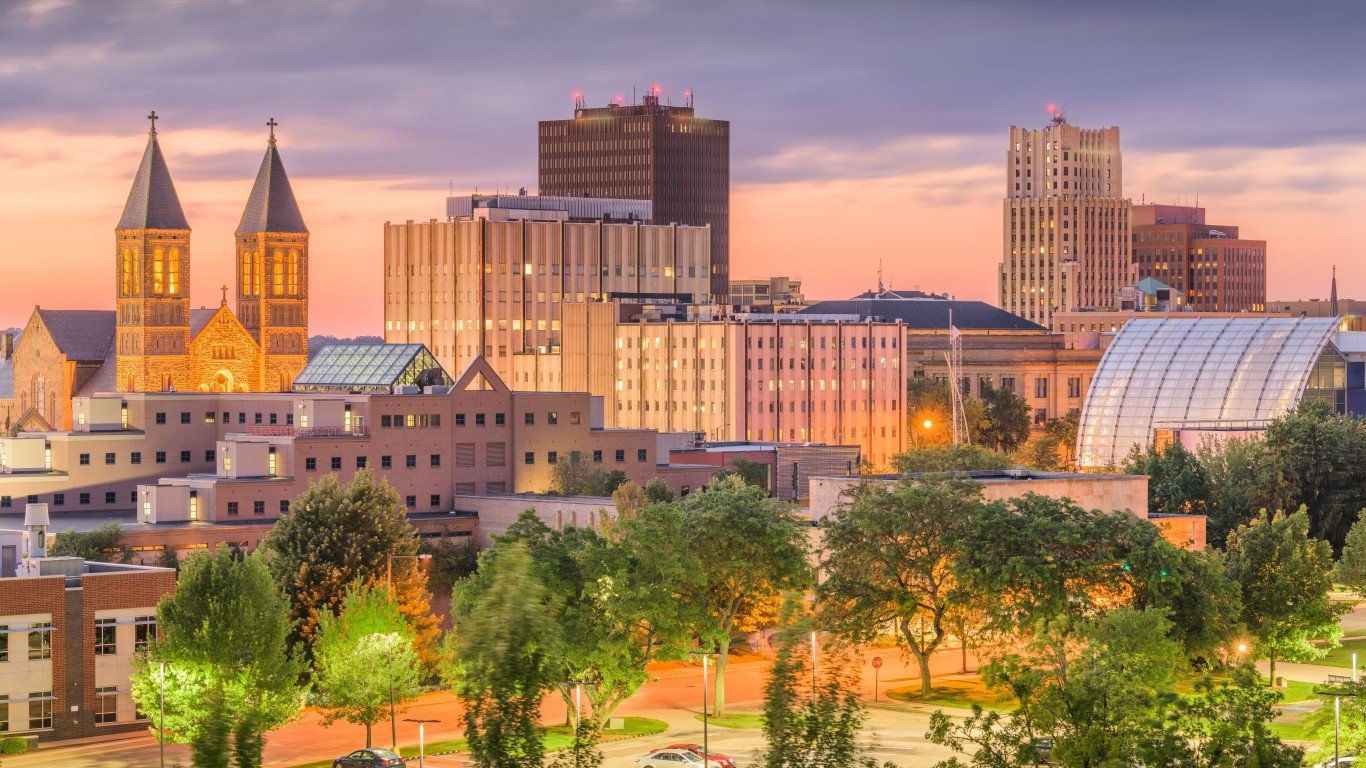
18. Akron, OH
> Time needed to save up for a down payment: 3 years, 1 months
> Typical home down payment: $20,927
> Typical starter-home price: $104,637
> Median household income, 2-person family: $65,187
> Pct. of income going to savings: 9%

17. Cincinnati, OH-KY-IN
> Time needed to save up for a down payment: 2 years, 11 months
> Typical home down payment: $30,218
> Typical starter-home price: $151,092
> Median household income, 2-person family: $75,493
> Pct. of income going to savings: 14%
[in-text-ad-2]

16. Washington-Arlington-Alexandria, DC-VA-MD-WV
> Time needed to save up for a down payment: 2 years, 10 months
> Typical home down payment: $68,289
> Typical starter-home price: $341,444
> Median household income, 2-person family: $117,658
> Pct. of income going to savings: 20%

15. Waterloo-Cedar Falls, IA
> Time needed to save up for a down payment: 2 years, 10 months
> Typical home down payment: $18,281
> Typical starter-home price: $91,403
> Median household income, 2-person family: $73,738
> Pct. of income going to savings: 9%
[in-text-ad]

14. Baltimore-Columbia-Towson, MD
> Time needed to save up for a down payment: 2 years, 9 months
> Typical home down payment: $42,208
> Typical starter-home price: $211,039
> Median household income, 2-person family: $90,722
> Pct. of income going to savings: 16%

13. Champaign-Urbana, IL
> Time needed to save up for a down payment: 2 years, 8 months
> Typical home down payment: $20,433
> Typical starter-home price: $102,166
> Median household income, 2-person family: $79,226
> Pct. of income going to savings: 9%

12. Fond du Lac, WI
> Time needed to save up for a down payment: 2 years, 8 months
> Typical home down payment: $24,596
> Typical starter-home price: $122,982
> Median household income, 2-person family: $78,065
> Pct. of income going to savings: 12%
[in-text-ad-2]

11. Hartford-East Hartford-Middletown, CT
> Time needed to save up for a down payment: 2 years, 8 months
> Typical home down payment: $39,600
> Typical starter-home price: $198,000
> Median household income, 2-person family: $90,143
> Pct. of income going to savings: 16%

10. Des Moines-West Des Moines, IA
> Time needed to save up for a down payment: 2 years, 7 months
> Typical home down payment: $30,944
> Typical starter-home price: $154,720
> Median household income, 2-person family: $77,987
> Pct. of income going to savings: 14%
[in-text-ad]

9. Madison, WI
> Time needed to save up for a down payment: 2 years, 6 months
> Typical home down payment: $48,508
> Typical starter-home price: $242,538
> Median household income, 2-person family: $88,507
> Pct. of income going to savings: 21%
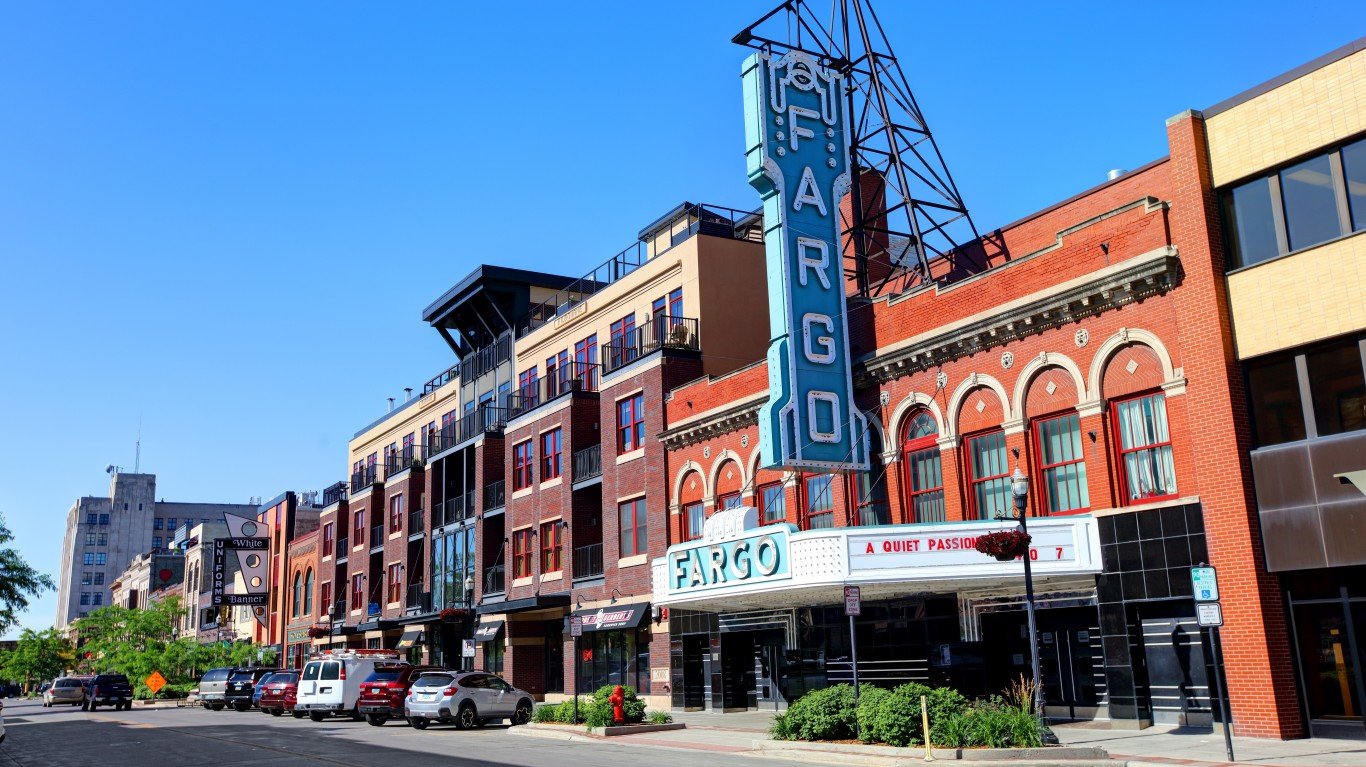
8. Fargo, ND-MN
> Time needed to save up for a down payment: 2 years, 5 months
> Typical home down payment: $37,553
> Typical starter-home price: $187,766
> Median household income, 2-person family: $81,654
> Pct. of income going to savings: 18%

7. Bridgeport-Stamford-Norwalk, CT
> Time needed to save up for a down payment: 2 years, 5 months
> Typical home down payment: $60,606
> Typical starter-home price: $303,031
> Median household income, 2-person family: $105,587
> Pct. of income going to savings: 22%
[in-text-ad-2]

6. Bismarck, ND
> Time needed to save up for a down payment: 2 years, 4 months
> Typical home down payment: $42,584
> Typical starter-home price: $212,918
> Median household income, 2-person family: $77,904
> Pct. of income going to savings: 20%
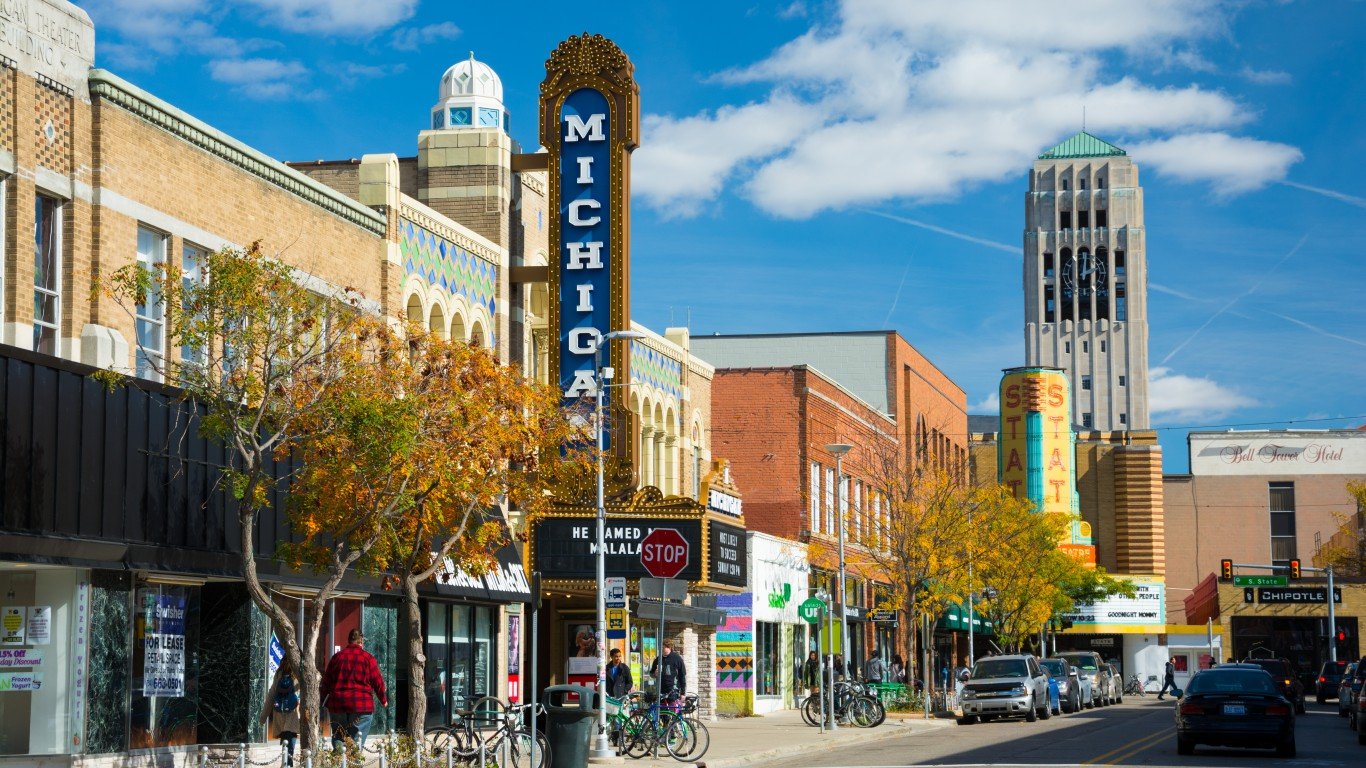
5. Ann Arbor, MI
> Time needed to save up for a down payment: 2 years, 4 months
> Typical home down payment: $45,799
> Typical starter-home price: $228,996
> Median household income, 2-person family: $93,794
> Pct. of income going to savings: 21%
[in-text-ad]

4. Trenton-Princeton, NJ
> Time needed to save up for a down payment: 1 years, 10 months
> Typical home down payment: $32,898
> Typical starter-home price: $164,490
> Median household income, 2-person family: $82,464
> Pct. of income going to savings: 18%
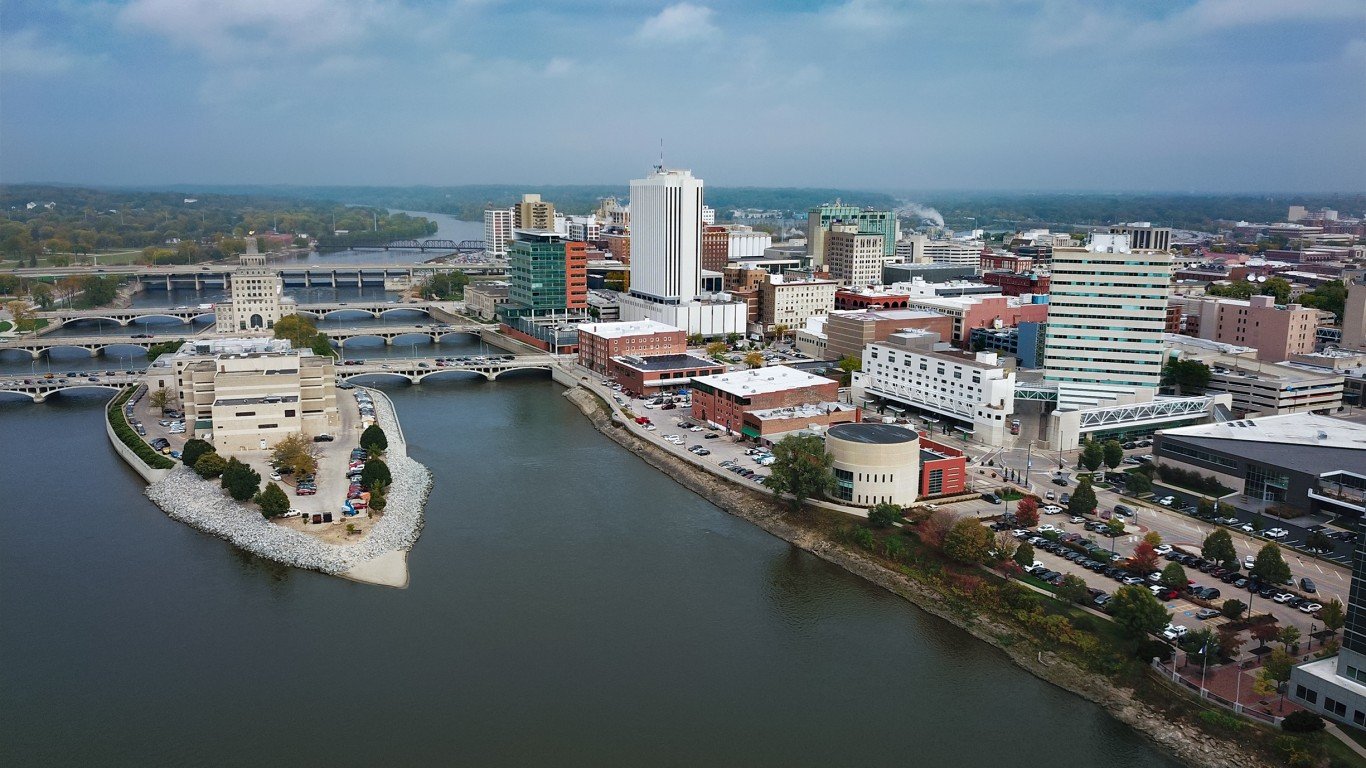
3. Cedar Rapids, IA
> Time needed to save up for a down payment: 1 years, 9 months
> Typical home down payment: $23,436
> Typical starter-home price: $117,181
> Median household income, 2-person family: $71,204
> Pct. of income going to savings: 17%

2. Springfield, IL
> Time needed to save up for a down payment: 1 years, 3 months
> Typical home down payment: $16,380
> Typical starter-home price: $81,901
> Median household income, 2-person family: $79,874
> Pct. of income going to savings: 15%
[in-text-ad-2]
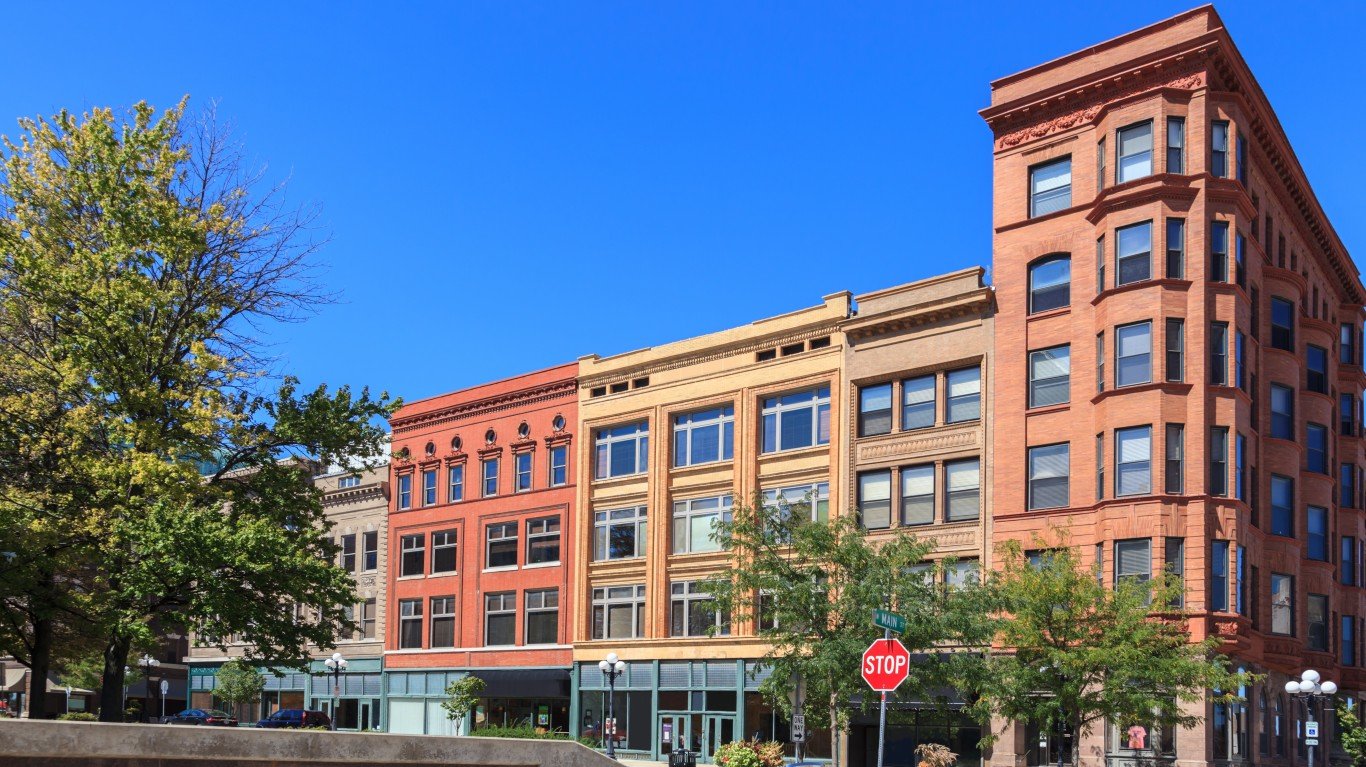
1. Bloomington, IL
> Time needed to save up for a down payment: 1 years, 0 months
> Typical home down payment: $21,050
> Typical starter-home price: $105,249
> Median household income, 2-person family: $91,669
> Pct. of income going to savings: 22%
Methodology
To determine the metro areas where residents can save for a down payment the fastest, 24/7 Wall St. reviewed the report 2022’s Best Metros Where Renters Can Save Fastest for Their First Home from RentCafe.
The report determined how long it would take for a couple to save for a down payment based on the metro area’s median income using data from the U.S. Census Bureau’s 2019 American Community Survey, the price of a typical starter home based on data from Zillow, and the percentage of income that can go to savings.
How much each couple could save as a percentage of income was based on the Economic Policy Institute’s Family Budget Calculator (with each metro’s median rent costs from the Census replacing housing costs) and additional spending based on the U.S. Bureau of Labor Statistics – Consumer Expenditure Survey, 2018-2019.
Take This Retirement Quiz To Get Matched With An Advisor Now (Sponsored)
Are you ready for retirement? Planning for retirement can be overwhelming, that’s why it could be a good idea to speak to a fiduciary financial advisor about your goals today.
Start by taking this retirement quiz right here from SmartAsset that will match you with up to 3 financial advisors that serve your area and beyond in 5 minutes. Smart Asset is now matching over 50,000 people a month.
Click here now to get started.
Thank you for reading! Have some feedback for us?
Contact the 24/7 Wall St. editorial team.
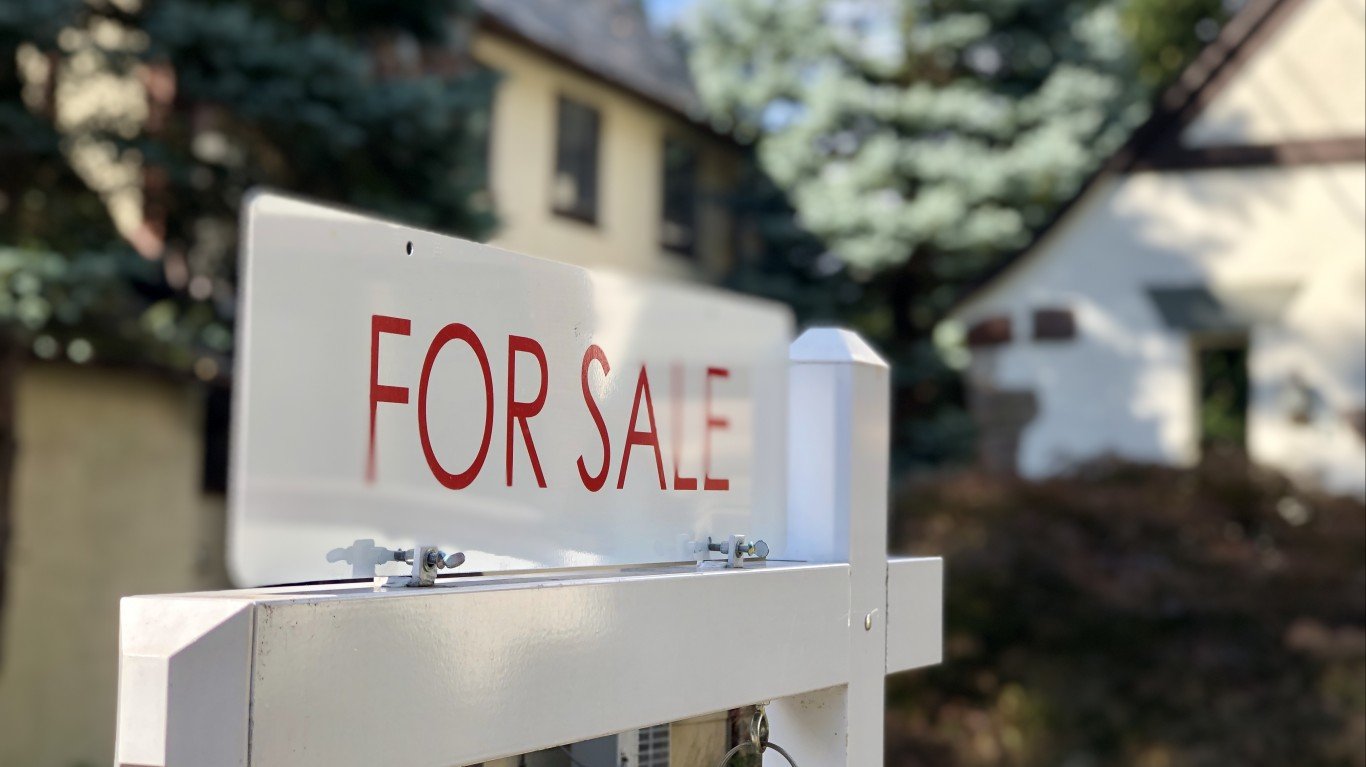 24/7 Wall St.
24/7 Wall St.